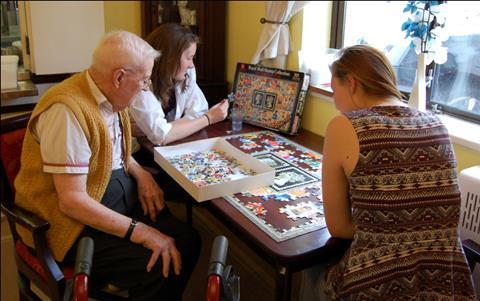Even though it features in the recent NHS long-term plan, good volunteering requires considerable resources and robust governance frameworks to mitigate risks. By Alison Leary

Volunteering has been around in healthcare for many years as a successful way of adding some comfort to the experience of care in hospital or the community.
Volunteers in health range in the scope of work that they undertake from supporting services, such as providing meet and greet, to advanced pre-hospital care provided by unpaid but regulated professionals. Volunteering has been shown to benefit both organisations and volunteers.
The mass expansion of any workforce, paid or unpaid can also have consequences. In England, the community interest company Helpforce is anticipating a reported network of more than 150,000 volunteers.
After a Daily Mail appeal, over 30,000 people signed up to be volunteers in the NHS – a tremendous response. It’s a campaign backed by celebrities and even the royal family. Volunteering also featured in the recent NHS long-term plan in areas such as supported self management.
The volunteering vision is laudable, but it also raises some red flags that reflect the current state of the workforce. The offer seems to include filling the gaps left by professional staff who no longer have time or resource to fulfil their duties.
The Helpforce founder’s vision is that volunteers will help you understand your treatment by explaining and reassurance, mobilise you in hospital when the staff are too busy and ensure that vulnerable patients are guided through their healthcare journey.
Being unpaid does not absolve an individual or organisation of professional accountability or personal responsibility
Being unpaid does not absolve an individual or organisation of professional accountability or personal responsibility.
A conversation recently made me reflect on my time as a clinical volunteering leader of almost 50,000 people – the majority of whom were essentially unregistered, unpaid healthcare workers – I have seen the need for robust governance first hand.
Having supported volunteers for many years and through proceedings as witnesses in coroners, civil and criminal courts, it’s possible to see the risk that is carried by volunteers and organisations.
One of the challenges is “role creep”. Not all employers are good employers and a combination of a volunteer’s passionate desire to help, limited skill and experience combined with an organisation under considerable pressure to perform can be a risky combination.
Many charities, including the one I volunteered for, invested in and established governance frameworks and very well defined volunteering roles for this reason, including hard boundaries around clinical work.
Impact on the existing workforce
A recent report by the King’s Fund looked at the views of frontline staff – the majority agreed that volunteering added value to patients, staff and volunteers’ experience. Most staff enjoyed working with volunteers and saw their potential but also identified the issue of definition of role boundaries.
A quick scan in the last couple of weeks on NHS Jobs yielded 22 volunteering opportunities across England. These included traditional volunteering roles such as front of house, way finding and supportive services.
About two thirds (14) included work that would have been done by the paid workforce – portering, feeding patients, chaperones, “alerting the nurses”, one to one care of people with dementia, making beds, cleaning bed areas, operating a mental health helpline and administrative roles such as ward/departmental reception, answering the phone, filing and other back office work.
Others included unpaid gardening/grounds keeping or driving/transport work for example bringing patients to and from clinics. The minimum time commitment required varied from two hours per month to 15 hours per week.
The scale of the proposed NHS volunteering initiative means some kind of effect on the paid workforce is likely, particularly the lower paid workforce.
Volunteers are an investment
Although volunteers are not paid a salary and are generally a good return on investment, volunteering isn’t something for nothing in terms of a workforce. Good volunteering requires considerable resource. Aside from process costs like recruitment and checks such as DBS, volunteers require training and ongoing support.
The nature of volunteering well is resource intensive. As the lead for the largest unpaid unregistered clinical workforce in England for over three years, it was possible to see how much resource was required to keep volunteers and patients safe and to keep them coming back. Volunteers can be vulnerable with no employment contract.
The nature of volunteering well is resource intensive. NHS England is planning to invest £2.3m in NHS volunteering but this does not come close to what the charitable sector invests in their volunteer workforce
NHS England is planning to invest £2.3m in NHS volunteering but this does not come close to what the charitable sector invests in their volunteer workforce.
After a short discussion on social media, a couple of volunteering managers contacted me – they were concerned that those promoting the expansion don’t understand the resource and effort that’s needed for a good volunteering experience.
Volunteers add a tremendous amount to health and social care, with the potential to add much more, but using them to paper over the cracks of gaps in the workforce is a risky strategy.





























1 Readers' comment